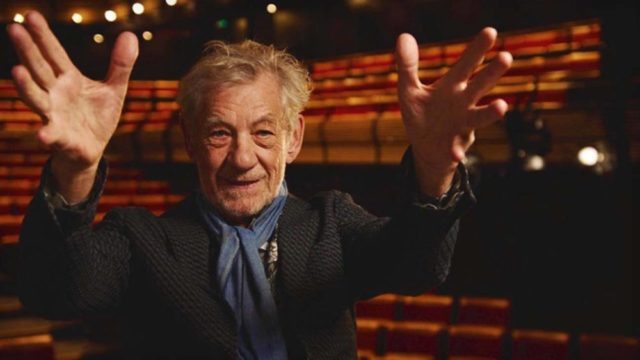
Sir Ian McKellen waxes poetic about Broadway in Oren Jacoby’s documentary
ON BROADWAY (Oren Jacoby, 2019)
Quad Cinema
34 West 13th St. between Fifth & Sixth Aves.
Opens Friday, August 20
quadcinema.com
As Broadway prepares to reopen in a big way in September following a year and a half of a pandemic lockdown that shuttered all forty-one theaters, Oren Jacoby’s documentary arrives like a love letter to the recent past, present, and future of the Great White Way (so named for its lights and illuminated marquees). “Without the theater, New York somehow would not be itself,” Sir Ian McKellen says near the beginning of On Broadway, which opens August 20 at the Quad and will have a special rooftop screening September 1 outside at the Marlene Meyerson JCC. “Live theater can change your life,” he adds near the end. Both lines appear to apply to how the city is coming back to life even as the Covid-19 Delta variant keeps spreading, but the film is nearly two years old, having made its New York City debut in November 2019 at DOC NYC.
On Broadway is a bit all over the place as it traces the history of Broadway from the near-bankrupt doldrums of 1969-72 to its rebirth in the 1980s and 1990s as a commercial force while also following Richard Bean’s UK import The Nap as it prepares to open September 27 at MTC’s Samuel J. Friedlander Theatre. I was a big fan of The Nap, calling it “a jolly good time . . . a tense and very funny crime thriller” in my review. Jacoby speaks with Bean, director Daniel Sullivan, and star Alexandra Billings, the transgender actor playing transgender character Waxy Bush. The behind-the-scenes look at the play, which was taking a big risk, lacking any big names and set in the world of professional snooker, is the best part of the film and it deserved more time instead of focusing on how such innovators as Stephen Sondheim, Bob Fosse, Andrew Lloyd Webber, Mike Nichols, and Michael Bennett helped turn around Broadway’s misfortunes with such popular shows as Pippin, Chicago, A Chorus Line, Annie, Evita, Cats, Amadeus, and Nicholas Nickleby, ultimately leading to Rent, Angels in America, and Hamilton. But Broadway still found room for August Wilson’s ten-play Pittsburgh Cycle.
The film explores how spectacle, celebrity, and extravaganza began ruling the day, at the expense of new American plays. “This could be a business,” Disney head Michael Eisner remembers thinking; his company bought a theater and produced such hits as Beauty and the Beast and The Lion King, which attracted families paying exorbitant ticket prices and going home with plenty of merch. Jacoby speaks with Sidney Baumgarten and Rebecca Robertson, who were involved in transforming Times Square from a haven for addicts, hookers, and porn shops to a place where parents could bring their kids to see a show. “We’re like Las Vegas now,” Tony-winning director Jack O’Brien laments.
Among the many other theater people sharing their love of Broadway — as well as their concerns — are John Lithgow, George C. Wolfe, Alec Baldwin, Helen Mirren, Tommy Tune, Hal Prince, Cameron Mackintosh, James Corden, Nicholas Hytner, David Henry Hwang, Oskar Eustis, and Hugh Jackman. “In the theater, you have to be present. You have to be present as an artist, and you have to be present as an audience member, for the experience to really happen,” Emmy, Tony, and Obie winner Christine Baranski says, evoking what it feels like as we wait for Broadway to reopen this fall. “And when you see a great performance, it is a spiritual experience.”
Jacoby, whose previous works include Shadowman, Master Thief: Art of the Heist, and My Italian Secret: The Forgotten Heroes, will be at the Quad for Q&As at the 7:00 screenings on August 20 and 21. But it’s Sardi’s maître d’ Gianni Felidi who gets to the heart of it all. “This is what Broadway’s about,” he says. “Great theater is a mirror to the human condition, to us, to people, and how we’re really all the same despite our differences, our perceived differences; be it if we’re from a different race, a different gender, a different sexual orientation, we’re really all the same. And that’s what theater shows us.”